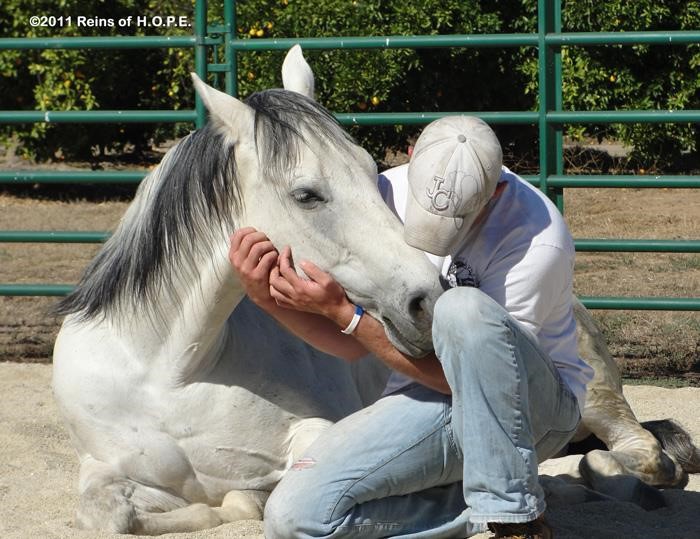By Brent Allen
Allen Financial Insurance Group / The Equestrian Group
www.EQGroup.com 800.874.9191
Ask any horseman about the physical and mental therapeutic value of their horse and they will almost certainly share stories extolling it’s virtues. There is a special bond between a horse and rider that cannot really be explained… only experienced. I personally have found it impossible to ride and stress at the same time. In the 1960’s the medical and human services communities discovered the merits of EAP and incorporated therapeutic riding into their special need programs.
The benefits of horseback riding are as numerous as the types of disabilities and conditions served. Research shows that students who participate in therapeutic riding can experience physical, emotional and mental rewards. Because horseback riding gently and rhythmically moves the rider’s body in a manner similar to a human gait, riders with physical disabilities often show improvement in flexibility, balance and muscle strength.
For individuals with mental or emotional disabilities, the unique relationship formed with the horse can lead to increased confidence, patience and self-esteem. The sense of independence found on horseback benefits all who ride. The therapeutic qualities of horseback riding are recognized by many medical professionals, including the American Physical Therapy Association and the American Occupational Therapy Association.
Equine Assisted Therapy is now an established discipline in which horses are used as a tool for both physical therapy and emotional growth and learning. In 1969 NARHA (North American Riding for the Handicapped Assn) was formed to promote equine facilitated therapy and activity programs in the United States and Canada. NARHA subsequently changed it’s name to PATH (Professional Assn of Therapeutic Horsemanship).
A second international EAP association, EAGALA (Equine Assisted Psychotherapy & Equine Assisted Learning), was formed in 1999. It became the leading international non-profit association for professionals using equine therapy to address mental health and human development needs. EAGALA has over 4000 members in 49 countries.
The establishment of equine assisted therapeutic programs created several challenges for the insurance industry. Like most businesses, insurance companies specialize in different industries such as retail, manufacturing, medical and agribusiness. EAP created a need for a new hybrid policy never anticipated by the insurance community. Medical and equine professionals were forming partnerships requiring coverage for both medical malpractice and equine professional liability and they could not find coverage from their respective insurance companies.
In 1969 Allen Financial Insurance Group designed a national policy for EAGALA through it’s specialty division The Equestrian Group. The policy extended coverage to insure their unique combination equine assisted therapy exposures. Since then, the EAP industry has evolved and diversified to serve a much larger cross section of human services. EAP is now applied in settings ranging from alcoholism and drug rehabilitation to the Wounded Warrior Project treating veterans with PTSD. To keep pace with the rapid changes in social services and mental health, Allen Financial created a new department for Human & Social Service Insurance Programs. These policies offer both comprehensive coverage and the flexibility to tailor an insurance package to the specific needs of the human service provider. Comprehensive general liability, Professional liability and Umbrella coverage can now be offered in one seamless policy.
A Human Services Organization is broadly defined as an organization uniquely approaching the objective of meeting human needs through an interdisciplinary knowledge base. It focuses on prevention as well as remediation of problems. It maintains a commitment to improving the overall quality of life of service populations. The Human Services profession is one which promotes improved service delivery systems by addressing not only the quality of direct services, but also by seeking to improve accessibility, accountability, and coordination among professionals and agencies in service delivery.
A Human services professional is a person who hold professional and paraprofessional jobs in such diverse settings as group homes and halfway houses; correctional, intellectual disability, and community mental health centers; family, child, and youth service agencies, and programs concerned with alcoholism, drug abuse, family violence, and aging. Depending on the employment setting and the kinds of clients served there, job titles and duties vary a great deal.
The primary purpose of the human services professional is to assist individual and communities to function as effectively as possible in the major domains of living.
About the Author
Brent Allen is CEO of Allen Financial Insurance Group. Established in 1971, Allen Financial is a national provider of commercial specialty insurance programs. Mr. Allen is considered to be one of the equine insurance and human services risk management. AFIG Insurance products are distributed through a national network of over 2,500 insurance professionals.


Recent Comments